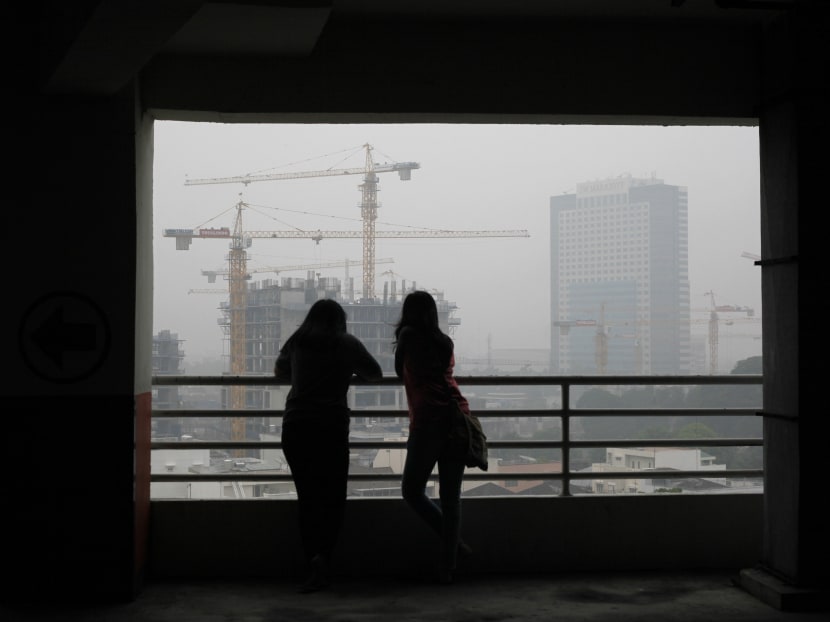Indonesians in worst haze spots to be evacuated
JAKARTA — The Indonesian government will evacuate more people affected by the thick haze in the worst-hit areas of Sumatra and Kalimantan as a last resort in order to mitigate the humanitarian crisis caused by the forest fires, said Coordinating Minister for Political, Legal and Security Affairs Luhut Pandjaitan today (Oct 22).

Indonesian women are silhouetted against the city skyline which is shrouded by the haze from forest fires, in Medan, North Sumatra, Indonesia. Photo: AP
JAKARTA — The Indonesian government will evacuate more people affected by the thick haze in the worst-hit areas of Sumatra and Kalimantan as a last resort in order to mitigate the humanitarian crisis caused by the forest fires, said Coordinating Minister for Political, Legal and Security Affairs Luhut Pandjaitan today (Oct 22).
Speaking to reporters at a news conference Mr Luhut said massive and measured action needed to be taken, after a report from the Meteorology, Climatology, and Geophysics Agency (BMKG) indicated there was little possibility of rain before the end of next month.
“There has to be a massive response to overcome this,” said Mr Luhut today. “That’s why we (the relevant ministers) met today because the weather forecast indicate there is little possibility of rain until the end of November.”
He added: “That means the next five weeks will be critical for us, we have to act now, we cannot wait.”
Late last month, officials in Riau province evacuated babies under six months of age and their mothers as the air pollution index hovered above 1,000. Those evacuated were housed in a makeshift nursery in a town hall equipped with air conditioners, cribs and a health clinic.
The minister explained that next wave of planned evacuations in Sumatra and Kalimantan would first focus on infants and children. Those evacuated may be moved to the southern part of the region, which has a lower Air Pollutant Standard Index (ISPU).
“If the ISPU [in the southern region] is also severe, then they will be evacuated to the ships,” said Mr Luhut.
He explained that he was considering using battle ships from the navy and vessels from the police as temporary shelter for the next five to six weeks to house those affected by the haze.
Vessels under state-owned shipping firm PT Pelayaran Nasional Indonesia (Pelni) may also be commandeered for the effort.
According to Mr Luhut, President Joko Widodo has issued a presidential instruction on smoke handling, which will serve as a legal protection for the ministries to carry out necessary actions to mitigate the effects of the haze.
The Indonesian Health Ministry is expected to issue air pollution standards for the local governments to follow as an indication of when they need to start evacuating people. Mr Luhut added that relevant agencies would have to ensure there is enough food for the people, and no interruption in electricity so that air conditioners and air purifiers can continue to operate.
In his update on fire-fighting operations, Mr Luhut said that water bombing efforts would not be able to put out the forest fires completely, adding that those efforts had limited impact in curbing the spread of the fires.
The minister said the forest fires have caused some parts of the peatlands to burn as deep as 10 metres below ground and that heavy rainfall for a few days at a stretch is what is needed to put these fires out.
The government has also prepared other steps, including an education program and sufficient stocks of food and electricity.
“Electricity is important to operate electronic equipment that can clear the air,” said Mr Luhut.
At the same news conference, Education and Culture Minister Anies Baswedan said that all school activities would stop when the air quality reaches a certain level. Mr Anies said students do not have to worry about being left behind in their studies when schools need to be closed.
Students affected by the haze will not be judged the same in their exams, as their standards will be different compared to other students from schools not affected by the haze. Mr Anies also noted that some teachers still continue to conduct classes as they are worried about getting paid less for the reduced number of teaching hours.
He reassured teachers that their salaries would not be cut. He also told reporters the Education Ministry has prepared special television programmes that students can watch at home when schools need to be closed. AGENCIES






